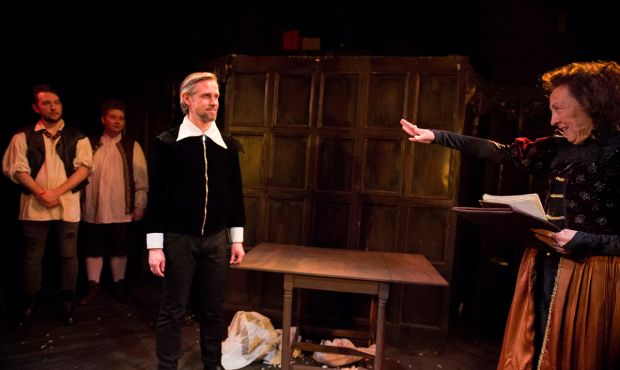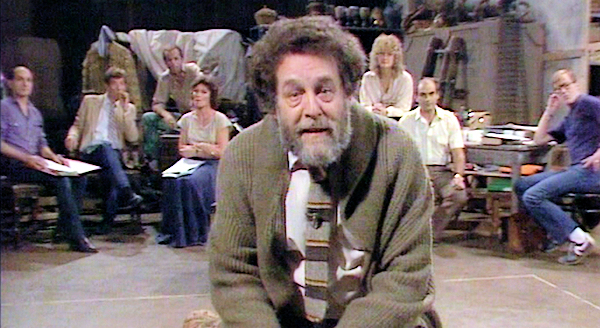Review: Foul Pages (Hope Theatre)

© LHPhotoshots
Was Shakespeare a cross-dresser? Forget the authorship debate – man from Stratford, Earl of Oxford, blah, blah, blah – Robin Hooper’s speculative history play has other, more pressing questions in mind. At one stage, Foul Pages finds Shakespeare alone in the woods wearing a gown and, er, taming the shrew. It’s quite the mental image. Did it happen? Who could ever know?
The point of Foul Pages is that we just can’t: the whole of history is riddled with holes. What we know of it is nothing but fiction and, Hooper argues, it leaves an awful lot out – not least of all, homosexuality.
An intricate, if clumsy play with big ideas beneath, Foul Pages speculates about a real event. In autumn 1603, newly enthroned King James I visited the Countess of Pembroke’s estate to escape from the plague. She wanted to plead for Walter Raleigh’s pardon, up for execution on charges of treason. "We have the man Shakespeare with us," she writes to her son. His troupe perform – we don’t know what – and within the week, Raleigh goes free.
So much for the facts. Hooper postulates a performance of As You Like It, still very much a work in progress. Ian Hallard‘s Shakespeare, pearl earring dangling from his left lobe, and his actors, all gay, rock up to rework the play. Speeches are rewritten, parts are recast – all to please Shakespeare’s patron and, in turn, the King, who’s taken a shine to one of the players.
Hooper’s a former Royal Court literary manager, so it's intriguing to see him highlight the people behind the playwright. His Bard might pull As You Like It together, but it’s the product of others’ input as well: political pressure from his patron, his brother’s dramaturgical notes, tantrums from actors who want more lines. All of them twist his play out of (or into) shape, but so does the simple fact of the crowd. He peppers his play with lewd innuendo and gay subtext purely to please his particular audience, namely King Jim.
The focus, then, is on the contingency of art – that even masterpieces are made by circumstance and chance – and, through it, that of history as a whole. Hooper asks not just how history happens, but how it reaches us down the line; what gets recorded, what gets erased. Flagging the whims and emotions that motor major events, all the way to King James’ verdict on Raleigh, Hooper shows how the heart leads and the head follows – a fact all too often overlooked by historians.
In fact, Hooper’s point is that a lot gets lost along the way, ironed out by invisibility or by assumption. The French refugees concealed in the walls, Protestants in hiding, make no mark on the history books, but neither does the homosexuality Hooper threads throughout. His point is that it existed – just out of sight. The same goes for Shakespeare and his wank in the woods.
Hooper writes with shades of Howard Barker – Raleigh’s dog Chop, gamely played by James King, gets his say on events – and the play’s gesture is richly theatrical, at once a reclamation of history and a re-imagining. It uses the stage to make something else possible, perhaps even actual in its rewiring real events. Equally, though, he lays it on a bit thick: an overload of fabrication just tips the scales and Matthew Parker’s production, with its tubthumping bass-backed scene changes, tries rather too hard to inject it with freshness. With so little at stake (and so much acting on show), it’s quite hard to care. For all its heart and smarts, an historical curio.
Foul Pages runs at the Hope Theatre, Islington until 17 March.














